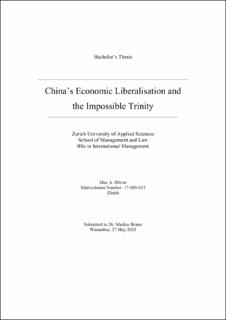Please use this identifier to cite or link to this item:
https://doi.org/10.21256/zhaw-21757| Publication type: | Bachelor thesis |
| Title: | China’s economic liberalisation and the impossible trinity |
| Authors: | Dörrer, Max A. |
| Advisors / Reviewers: | Braun, Markus |
| DOI: | 10.21256/zhaw-21757 |
| Extent: | 69 |
| Issue Date: | 2020 |
| Publisher / Ed. Institution: | ZHAW Zürcher Hochschule für Angewandte Wissenschaften |
| Publisher / Ed. Institution: | Winterthur |
| Language: | English |
| Subject (DDC): | 330: Economics |
| Abstract: | China’s global economic and political ascent, as well as its unique mix of state control and free market principles, has been unprecedented and attracted foreign interest as well as criticism to its economic system. Although China pledged towards increasing economic openness, its progress is ambiguous and difficult to assess. Due to China’s economic power, it is necessary to understand and evaluate its macroeconomic policy-making in order to analyse its strengths and weaknesses, as well as to predict future developments. The main objective of this thesis was to research China’s policy stance and its relationship in line with the Impossible Trinity, and to outline the respective reforms in regard to the country’s capital accounts, exchange rate regime and monetary sovereignty. Moreover, this thesis aimed to evaluate if the model of the Impossible Trinity can be applied to China and lastly, to evaluate potential areas of future reforms. A literature review and expert interviews were conducted to answer the aforementioned objectives. The literature review elucidated the liberalisation reforms and the Impossible Trinity, and its particular applicability to China. The expert interviews supported a holistic interpretation of the results and provided insights into potential future liberalisation steps. In particular, China measurably decreased its exchange rate control through wider trading bandwidths and market-based pricing mechanisms. Secondly, the country reformed its capital accounts through special investment channels and by connecting its stock exchanges together. However, the country’s assumed progress towards capital account openness has not been quantifiably reflected. China’s level of capital account openness remained at constant levels since the year of 2000. Lastly, China’s monetary independence had dropped in 2008 and resurged by 2016, which may be attributed to the global financial crisis and the emergence of the shadow-banking sector. Taken together, China has applied a middle-ground configuration of the Impossible Trinity with relative monetary sovereignty, a relatively controlled exchanged rate and minimally open capital accounts. Accordingly, the model of the Impossible Trinity is assumed to be applicable to China despite the country’s rejection of this. Lastly, future reforms are difficult to assess and must be considered within a political and economic context. However, an increase in China’s monetary independence, balanced through a more freely floating exchange rate, whilst maintaining its capital account openness, appears to be likely. This study contributed to the existing literature on China’s economic liberalisation reforms and its macroeconomic policy stance in line with the Impossible Trinity. Moreover, this thesis has established grounds for future research on China’s application and interpretation of the Impossible Trinity. This thesis provided a basis to understand China’s macroeconomic framework. Further research is needed to clearly distinguish China’s economic advantages and risks, and to deduce potential implications for other economies. |
| URI: | https://digitalcollection.zhaw.ch/handle/11475/21757 |
| License (according to publishing contract): | CC BY 4.0: Attribution 4.0 International |
| Departement: | School of Management and Law |
| Appears in collections: | BSc International Management |
Files in This Item:
| File | Description | Size | Format | |
|---|---|---|---|---|
| Bachelor’s_Thesis_Doerrer_Max.pdf | 1.6 MB | Adobe PDF |  View/Open |
Show full item record
Dörrer, M. A. (2020). China’s economic liberalisation and the impossible trinity [Bachelor’s thesis, ZHAW Zürcher Hochschule für Angewandte Wissenschaften]. https://doi.org/10.21256/zhaw-21757
Dörrer, M.A. (2020) China’s economic liberalisation and the impossible trinity. Bachelor’s thesis. ZHAW Zürcher Hochschule für Angewandte Wissenschaften. Available at: https://doi.org/10.21256/zhaw-21757.
M. A. Dörrer, “China’s economic liberalisation and the impossible trinity,” Bachelor’s thesis, ZHAW Zürcher Hochschule für Angewandte Wissenschaften, Winterthur, 2020. doi: 10.21256/zhaw-21757.
DÖRRER, Max A., 2020. China’s economic liberalisation and the impossible trinity. Bachelor’s thesis. Winterthur: ZHAW Zürcher Hochschule für Angewandte Wissenschaften
Dörrer, Max A. 2020. “China’s Economic Liberalisation and the Impossible Trinity.” Bachelor’s thesis, Winterthur: ZHAW Zürcher Hochschule für Angewandte Wissenschaften. https://doi.org/10.21256/zhaw-21757.
Dörrer, Max A. China’s Economic Liberalisation and the Impossible Trinity. ZHAW Zürcher Hochschule für Angewandte Wissenschaften, 2020, https://doi.org/10.21256/zhaw-21757.
Items in DSpace are protected by copyright, with all rights reserved, unless otherwise indicated.